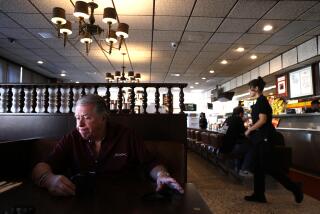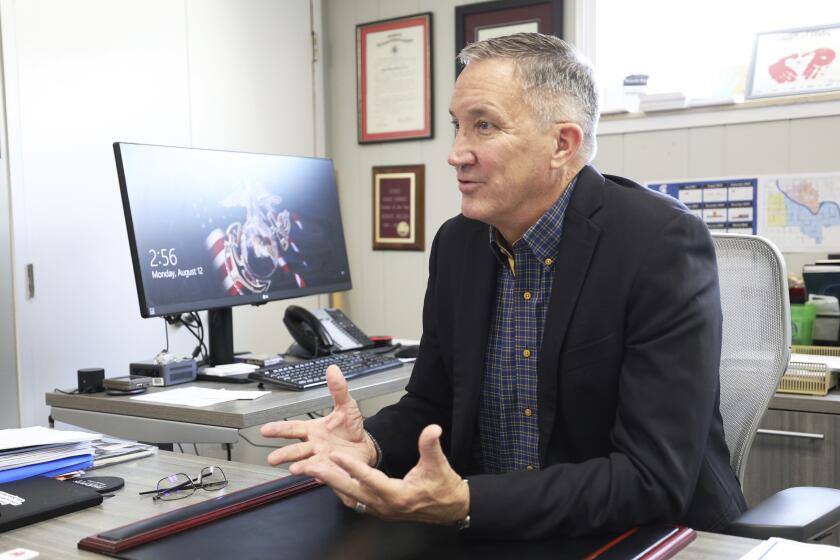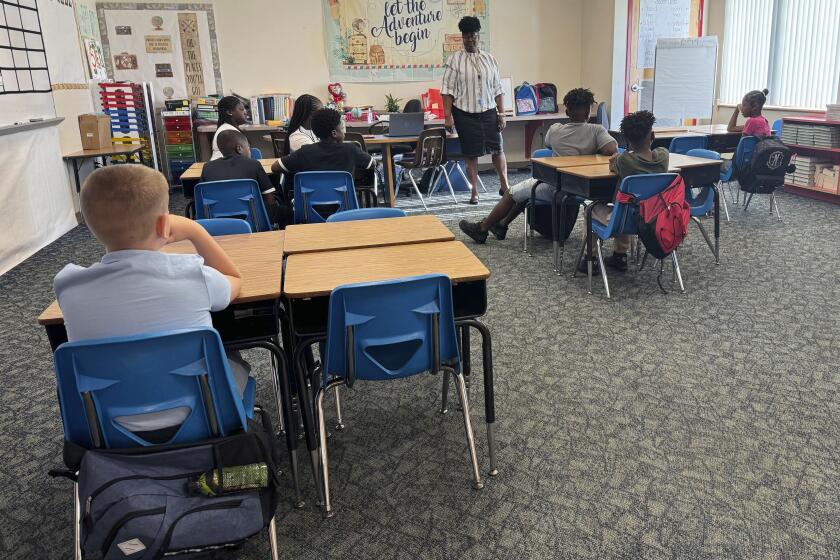Genethia Hayes
Genethia Hudley Hayes, by her own admission, is either loved or hated. Don’t call her a diplomat. She’s not. Nor is she a politician. She claims no higher ambition than her current hot seat as president of the L.A. School Board.
Impatient for change, Hayes angered many black elected officials when Mayor Richard Riordan appeared to handpick her as part of his slate of school-board reformers. With financial backing from Riordan and his friends, she beat the incumbent, Barbara M. Boudreaux, and today represents the 1st District, which includes the historically black, and now heavily Latino, neighborhoods of South-Central Los Angeles and Southwest Los Angeles, and also stretches north to the Pico-Fairfax area.
In office since July 1, Hayes has her share of fans, who applaud her assault on waste, incompetence and poor public schools. But she has made many enemies. Hayes speaks Spanish yet has few friends left among the Latino political elite. She led the fight to force out former Supt. Ruben Zacarias, a popular chief. She also voted to abandon construction of the Belmont Learning Complex. That high school, which remains half-built on an environmentally suspect abandoned oil field, would have eased overcrowding in a predominantly Latino neighborhood west of downtown.
A fan of interim Supt. Ramon C. Cortines, Hayes supports his proposed reorganization. The plan would halve the number of administrators in the central office downtown. She believes he can get it done before he is scheduled to leave on June 30, though she wishes he would stay. She also endorses his proposal to pay outstanding teachers more, especially those who do well under adverse conditions. That pay-for-performance position won’t please the powerful United Teachers-L.A., which supported her candidacy.
Tough and opinionated, Hayes has turned off some board members with her salty language and strong leadership. She is not a professional educator, though she spent years working for better schools at the L.A. office of the Southern Christian Leadership Conference, the civil-rights organization founded by Martin Luther King Jr.
A product of public schools in Chicago and Los Angeles, Hayes, 54, believes she got an excellent education at Audubon Middle School and Dorsey High School before the ravages of Proposition 13. She began her college career at Cal State L.A., dropped out and completed her degree at a small, historically black school, Texas College, east of Dallas.
Back in Los Angeles, Hayes and her husband, Alton, bought a home in Windsor Hills because of the reputation of good local schools. But they made what Hayes insists is a still-painful decision to send their precocious daughter to private school because she could read prior to kindergarten. Kathryn, now an adult and bilingual, teaches in Santiago, Chile.
Hayes says she doesn’t talk shop with her husband, although he is principal of two child-development centers in the L.A. school system. Homebodies, they cheer the Lakers on television, watch movies and read mysteries and other fiction.
*
Question: Who should be the next superintendent?
Answer: . . . I am open to a nontraditional superintendent. Someone who is not an educator would be fine with me, as long as they had the skill and the capacity to manage in a way that turns an institution around, that picks up the mission and the vision of this board--which is that our focus has to be on children. . . . We are a $7.7-billion public corporation, but our business is educating children.
*
Q: Should the next superintendent be Latino?
A: Not for me; he or she doesn’t have to be Latino. They must be sensitive to and they must understand the needs of every community--not just the Latino community. Let me tell you something I’m not afraid to say for attribution: While 70% of the youngsters in this school district are Latinos, 30% of the youngsters are not Latinos. Are they not just as important? Are their needs not just as important?
We’ve got about 110,000 youngsters in this district that are black. We need to be about the business of looking at their educational needs, their literacy needs, their linguistic needs and how we get them from the bottom of the barrel to a competitive position in this district. . . . We have a large number of Asian youngsters, Armenian youngsters, white students, homeless students, poor students. If we are talking about diversity, we have to stop talking just about Latino youngsters.
*
Q: Sounds like you’re picking a fight with the Latino leadership.
A: I’m not picking a fight with the Latino leadership. They tend to believe I am. But what I am saying to any leadership in this city is that this is a system that educates 710,000 youngsters; and we have more diversity in Los Angeles than we do any place in the contiguous 48 states. If we are talking about educating youngsters, well, then every child counts. Why do some count more than others?
*
Q: You had a high profile in the fight to oust Dr. Zacarias. Why did you want him out?
A: In the long run, if things are swirling out of control in the second, the third, the fourth layers below you, and you’re sitting in the leadership position--even if you are not the genesis of the problem--you have an obligation to provide a solution. Absent a solution, then I think we had the wrong person in the leadership position. . . .
*
Q: That fight bruised your relationships with some Latino allies. Has there been any mending?
A: I have mended with people like [outgoing Assembly Speaker] Antonio Villaraigosa and [Assemblyman] Gil Cedillo. . . . I didn’t actually have a relationship with [state] Sen. [Richard] Polanco. I certainly believe we are on the same page about this, and we ought to be working together. With people like the folks that I worked with at MALDEF [Mexican American Legal Defense and Educational Fund], Arturo Vargas [executive director of the National Assn. of Latino Elected and Appointed Officials] and people like Monica Lozano [associate publisher of La Opinion], I don’t think those relationships are bruised. I believe they know my insistence is always going to be that every one of these youngsters is educated to their fullest potential. . . .
I have apologized if it was done clumsily. I have apologized if they felt insulted, if the Latino community felt insulted. I am not going to apologize anymore. I feel I did not do anything other than demand leadership that will go to any length that it needs to go to make sure these children are well-served. That’s what we all ought to be about the business of doing.
*
Q: Why did you vote against Belmont?
A: I don’t think we can build Belmont. I don’t think we can ever mitigate it and make it safe. I don’t think we ought to have a double standard that we say, for some people’s children, it’s OK for us to have a lower environmental standard for the community of youngsters at Belmont than we would in the [San Fernando] Valley. . . . I’m not going to wake up 15 years from now and have that school blow up with children in it. . . .
Nor do I believe it is fair to all of the youngsters in this district, many of them Latino, who need seats, to put $200 million, maybe $300 million, maybe $400 million, into one site.
*
Q: What do you say to those parents?
A: What I’d like to say to those parents in that community: More than anything else, my issue is finding seats for those students who have been on the bus for 20 years. My other issue is making sure when we build schools, even though they may not look like the schools we went to, that what we put into those schools are well-trained teachers who are going to present them with a rigorous curriculum.
*
Q: Will the LAUSD be able to build 150 schools within the next five years?
A: Not if we don’t have some legislative relief. . . . We are going to have to have the Legislature work with us to make sure [we get] the Prop. 1A [state bond] funds that our people voted for, that our taxes are going to support. . . . If the Los Angeles Unified School District is educating nearly one out of five [public-school students] in the state . . . shouldn’t the state--the state allocations board, the state Legislature--be helping us to find ways to get schools built? I don’t understand this adversarial, hostile relationship that everybody wants to have with LAUSD--particularly now when you have a Board of Education that . . . says we are going to put children first. We’re not going to play politics. We’re not going to play relationships. We’re not going to play ethnicity. We’re putting these children and their needs first.
*
Q: Mayor Riordan contributed a great deal to your campaign. Doesn’t that give him a great deal of access?
A: It doesn’t give him any more or any less access than anybody else who gives me money. Of course, I would return the mayor’s phone calls. I want to say this for the record: I don’t think the mayor’s the bad guy in this. To be real honest with you, I’m tired of people saying that he, for some reason, has some hidden agenda. First of all, this is a wealthy man who is the mayor of Los Angeles. Why does he need to make this his fight? What’s in this for him that is so draconian? This is a man who actually broke with many of his friends. He is against vouchers. . . . He’d like to see the district work. He’d like to see it managed well. He would like to see children get a good education so they can improve their lives. What is so bad about that?
*
Q: When people claim you are the mayor’s puppet, how do you respond?
A: I respond by asking people to look at my actions and not at the gossip they hear. Is there something I have done in the seven months I have been here that has, in fact, been what they might think would be at the behest of the mayor or at the behest of the white, downtown business community? . . . What have I done that has been inconsistent with my campaign?
*
Q: Let’s talk about your district. Worst scores, worst schools, highest concentration of inexperienced teachers--
A: . . . You cannot provide a rigorous, rich curriculum if 80% of the teachers on a faculty are emergency-credentialed teachers. . . . You cannot have schools where there are no teachers who are single-subject credentialed in their fields. For example, an algebra class that has a teacher who has an emergency credential and does not have a math background is not going to be the same in terms of the richness of or the rigor of the curriculum as a teacher who is at Grant, Van Nuys, Chatsworth, Reseda--you name the school--where the teacher is credentialed in math. You cannot have this kind of disparity anymore in the district. That’s an issue of equity. . . . You cannot have Crenshaw, Dorsey, Manual Arts, Fremont with no credentialed teachers in [academic] subject areas. You can’t not have [certified] physics teachers there and have six [certified] physics teachers someplace else. . . .
We need to make sure there is no longer the possibility of dumping all the teachers who have had trouble at other places into District 1. We need to make sure we are not doing that with administrators, so we don’t get administrators who have not been able to make the grade other places and they come into the central city. Mike Lansing and I have talked about this. If you look at District 7, he has the same set of issues that I do. . . .
*
Q: Don’t black teachers or administrators who are under attack appeal to you?
A: Yes, they do. My response to them is this: If they are doing an outstanding job, if they are doing a competent job, they don’t need my protection. If they’re not, I’m not going to protect them. I frequently have people call me up and tell me that they are under attack. Will I listen to them? Absolutely--that’s my job. I do listen to them. I do refer them to where they need to be referred. If it appears they are harassed or being attacked because they don’t speak Spanish, or they don’t speak Korean, I want those things investigated and I want them upfront and aboveboard. But I am not going to protect anybody. . . . I am not going to protect black people, if they are not being competent at their jobs. . . .
I’m sure, now, I’ll have the black community at my throat, as well as the Latino community. But, in some instances, we have black principals and black teachers who are just as much a part of this problem as are white ones and Latino ones and Asians ones. We are not blameless. . . .
Am I going to make sure African Americans do not suffer? Yes. I am going to be very clear that black people are not going to be the fallout. There is a place for black people who are competent in this district--whether they speak Spanish or not. . . . But if a black person is not measuring up, they need to go. As do Latinos. There are plenty of Latino administrators and teachers who are part of the problem. This is not about ethnicity. This is about are they capable and competent to provide leadership at a school that says these youngsters are going to be educated and there are no excuses.
*
Q: Where are you on breakup?
A: I can’t imagine why anybody would be talking about breaking up the district when we’re on the threshold of making this district work. . . . If somebody could give me evidence and data that supports that smaller districts do a better job than larger districts, if somebody could convince me that this is not just about power, who’s in charge and who’s in control, then I might be listening. . . . If someone could convince me that breaking up the district would improve student achievement . . . that it is best for the students, not for the adults, then somebody ought to tell me how that works.
More to Read
Sign up for Essential California
The most important California stories and recommendations in your inbox every morning.
You may occasionally receive promotional content from the Los Angeles Times.






